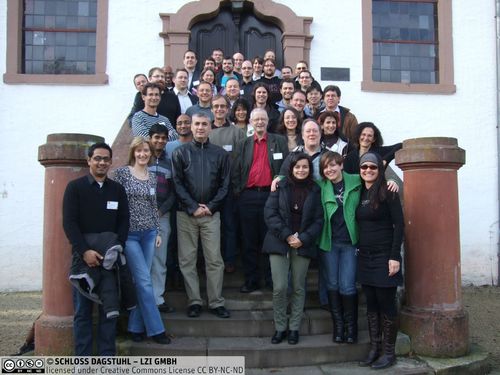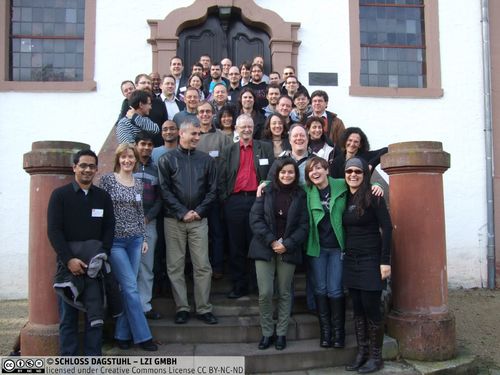Dagstuhl Seminar 11481
Models@run.time
( Nov 27 – Dec 02, 2011 )
Permalink
Organizers
- Uwe Aßmann (TU Dresden, DE)
- Nelly Bencomo (INRIA - Le Chesnay, FR)
- Betty H. C. Cheng (Michigan State University - East Lansing, US)
- Robert B. France (Colorado State University, US)
Contact
- Annette Beyer (for administrative matters)
Shared Documents
- Dagstuhl Materials Page (Use personal credentials as created in DOOR to log in)
External Homepage
To date, research on model-driven engineering (MDE) has mainly focused on the use of models during software development. This work has produced relatively mature techniques and tools that are currently being used in industry and academia to manage software complexity during development. Research on models@run.time seeks to extend the applicability of models and abstractions to the runtime environment, with the goal of providing effective technologies for managing the complexity of evolving software behaviour while it is executing.
As is the case for software development models, a run-time model is often created to support reasoning. However, in contrast to development models, run-time models are used to reason about the operating environment and runtime behavior, and thus these models must capture abstractions of runtime phenomena. Different dimensions need to be balanced, including resource-efficiency (time, memory, energy), context-dependency (time, location, platform), as well as personalization (quality-of-service specifications, profiles). The hypothesis is that because models@run.time provide meta-information for these dimensions during execution, run-time decisions can be facilitated and better automated. Thus, we anticipate this technology will play an integral role in the management of self-adaptive systems.
The problems targeted by the models@run.time community are multi-faceted and thus tackling them requires expertise from a variety of research areas. The Dagstuhl Seminar models@run.time brought together a diverse set of researchers and practitioners with a broad range of expertise, including MDE, software architectures, reflection, self-adaptive systems, validation and verification, middleware, robotics and requirements engineering.
The following gives the objectives of the seminar and describes the extent to which they were met:
- Objective: To identify and document the potential benefits of Models@run.time including benefits associated with their use in adaptive and autonomic systems. Extent Met: One of the working groups (Group 3: Uses and Purposes of M@RT) was charged with coming up with use cases that demonstrate the benefits associated with the use of models@run.time. The report produced by this group discusses the types of significant software systems that can benefit from use of models@run.time.
- Objective: To reach a common understanding of the terminology and associated concepts that underpin the use of different models once a system is deployed. Extent Met: Each working group defined the terminology and the concepts used in the descriptions of their primary outcomes.
- Objective: To identify a set of key research challenges that must be tackled to address the real-world problems posed by self-adaptive systems within the next five (5) years (the research roadmap). Extent Met: Each working group identified, discussed, and described the key challenges in its focus area. The identified challenges will be included in the roadmap we plan to publish.
- Objective: To also identify associated technology transfer strategies to ensure that the research in this area has impact on industrial practice and associated methodologies and tool-sets. Extent Met: Group 2 (Runtime updating/adaptation mechanisms) focused on discussing and analysing the effectiveness of technologies that have been developed to support models@run.time.
- Objective: To publish a collection of articles containing the roadmap, as well as papers from the participants. Extent Met: Plans have been put in motion for publishing peer-reviewed papers from participants in a LNCS State-of-the-Art Survey Volume on Models@run.time.
The seminar consisted of participant presentation and working group sessions. Monday and Tuesday morning were "speed dating" days, in which everyone (with the exception of some of the organizers, to better manage time) presented a 10-min introductory talk. The presenters covered a wide range of topics including adaptive cyber-physical systems, self-evolution, requirements-driven runtime adaptation, safe and trustworthy autonomous robots, adaptive and self-managing software, runtime variability and architectural reconfiguration at runtime. We also had two longer presentations by persons from industry (ERICSSON). The presenters were Joe Armstrong and Paer Emanuelsson. From Tuesday to Thursday participants worked in working groups that focused on particular aspects of models@run.time research. At the start of each day the organizers summarized the activities that were to take place and the deliverables that were to be produced at the end of the day. At the end of each day, each group presented their deliverables.
On Wednesday evening we had a productive panel where the following questions were discussed: What are the compelling business models for models@run.time?, What are the killer applications? What are the obstacles to deployment of models@run.time systems?, What are key enabling technologies for models@run.time (e.g., standards or component models).
- Mehmet Aksit (University of Twente, NL)
- Joe Armstrong (ERICSSON - Stockholm, SE)
- Uwe Aßmann (TU Dresden, DE) [dblp]
- Nelly Bencomo (INRIA - Le Chesnay, FR) [dblp]
- Amel Bennaceur (INRIA - Le Chesnay, FR) [dblp]
- Walter Cazzola (University of Milan, IT) [dblp]
- Betty H. C. Cheng (Michigan State University - East Lansing, US) [dblp]
- Amit K. Chopra (University of Trento, IT) [dblp]
- Siobhán Clarke (Trinity College Dublin, IE) [dblp]
- Fabio M. Costa (Universidade Federal de Goiás, BR)
- Kerstin I. Eder (University of Bristol, GB) [dblp]
- Pär Emanuelsson (Ericsson AB - Linköping, SE)
- Robert B. France (Colorado State University, US) [dblp]
- Nikolaos Georgantas (INRIA - Le Chesnay, FR) [dblp]
- Holger Giese (Hasso-Plattner-Institut - Potsdam, DE) [dblp]
- Martin Gogolla (Universität Bremen, DE) [dblp]
- Sebastian Götz (TU Dresden, DE) [dblp]
- Lars Grunske (TU Kaiserslautern, DE) [dblp]
- Gang Huang (Peking University, CN)
- Paola Inverardi (University of L'Aquila, IT) [dblp]
- Valerie Issarny (INRIA - Le Chesnay, FR) [dblp]
- Jean-Marc Jézéquel (IRISA / CNRS, FR) [dblp]
- Marin Litoiu (York University - Toronto, CA) [dblp]
- Brice Morin (SINTEF - Oslo, NO) [dblp]
- Pieter J. Mosterman (The MathWorks Inc. - Natick, US) [dblp]
- Hausi A. Müller (University of Victoria, CA) [dblp]
- Liliana Pasquale (University of Limerick, IE) [dblp]
- Pankesh Patel (INRIA - Le Chesnay, FR)
- Patrizio Pelliccione (University of L'Aquila, IT) [dblp]
- Anna Perini (CIT- FBK - Povo, IT) [dblp]
- Alfonso Pierantonio (University of L'Aquila, IT) [dblp]
- Nauman Ahmed Qureshi (Bruno Kessler Foundation - Trento, IT)
- Andres J. Ramirez (Michigan State University - East Lansing, US)
- David Redlich (Lancaster University, GB)
- Bernhard Rumpe (RWTH Aachen, DE) [dblp]
- Daniel Schneider (Fraunhofer IESE - Kaiserslautern, DE)
- Giordano Tamburrelli (Polytechnic University of Milan, IT) [dblp]
- Matthias Tichy (Universität Paderborn, DE) [dblp]
- Mario Trapp (Fraunhofer IESE - Kaiserslautern, DE) [dblp]
- Frank Trollmann (TU Berlin, DE) [dblp]
- Norha Milena Villegas Machado (University of Victoria, CA) [dblp]
- Thomas Vogel (Hasso-Plattner-Institut - Potsdam, DE) [dblp]
Keywords
- Runtime models
- Model-driven techniques
- MDE
- Ongoing adaptation
- Adaptive systems



